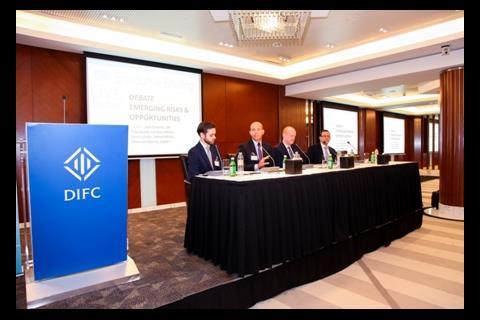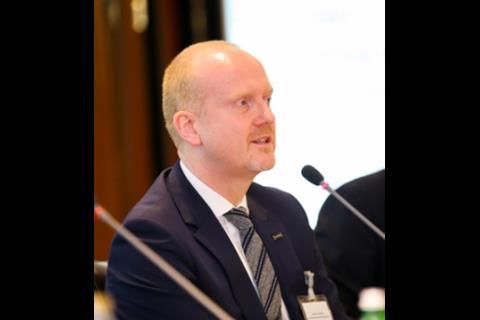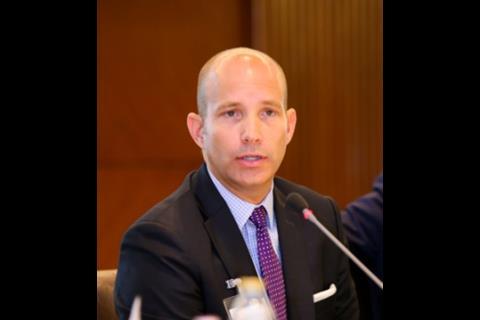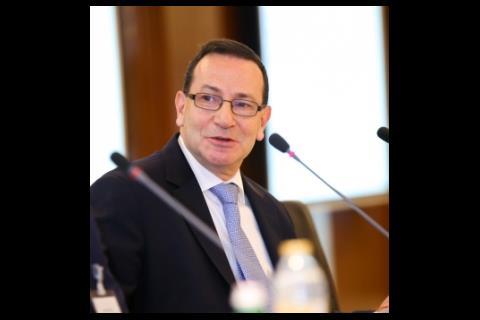Panel at GR event debate the best strategy for charting risks and opportunities in a rapidly-changing market
At the third GR Executive Briefing in Dubai last week, more than 180 senior executives from across the Middle East and North Africa (MENA) region gathered to debate the emerging risks and opportunities present in the local and regional insurance markets.
On the panel, which took place at the Dubai International Financial Centre (DIFC), were Lloyd’s head of UK, Ireland, Middle East and Africa Cameron Murray, Marsh Middle East & North Africa chief executive Steve Lundin and Lockton MENA chief executive Tony Saada.
The panel, chaired by GR editor, Jack Grocott, began by debating the causes of both new business opportunities and emerging risks in the region.
Saada said that local and global brokers and insurers should get praise for helping to mitigate the impact of emerging risks in MENA.
“Global brokers pay their role quite well with their clients in terms of helping them and giving them advice,” he said. “On the other side, insurers do the same, launching products in the region and training brokers about their products.
“So I would like to give credit to both local brokers and local and global insurers.”
The Lockton chief added that emerging risks often easily transcend national borders, but that much of the research and development surrounding these risks happens in more established (re)insurance markets by global players.
Murray said that Lloyd’s emerging risks team was well-versed on emerging risks, and added: “The list they have is long and very scary.”
Tackling such emerging risks well requires working with varied stakeholders, including scientists, governments and think tanks, Murray said.
“From the emerging risks team, the biggest message is ‘test your assumptions’,” he added. “For us as insurers, that’s quite a challenge. We need to quantify risk, that’s what we do. The emerging risks guys say we should turn that on its head and look for uncertainties. They come at it from a very different angle.”
Marsh’s Lundin said that brokers could look to the history of more mature markets to help predict future demand for services in less mature regions.
“I think our job as brokers involves leveraging what is known and bringing it to these fast developing markets,” he said.
The panel then turned its attention to the topic of the best way to attempt to chart emerging risks.
Saada said that companies such as Swiss Re take a thorough approach: “That involves assessing, identifying what the risks are, organising them and trying to quantify them.
“I think if there were more systemic approaches towards charting emerging risks we could turn around and say that we are more proactive than reactive on the subject.”
The (re)insurance sector was often too slow to adapt to emerging risks, he added: “My feeling is that by the time we’ve produced the product, the risk is no longer emerging and has become a special risk.”
Murray added that it was important to minimise that time, and said that brokers could help by working closer with their clients to meet demand “sooner rather than later”.
“I think that’s perhaps where the link is not happening as quickly as it should,” he added.
Cyber opportunities
The panel then began to discuss opportunities in newer product lines, such as cyber insurance.
Lundin said that clients showed an interest in the cover, but that “there is limited appetite for purchase at the moment”.
“I’m not sure this region has wrapped its head around the utility of a policy,” he added.
But the DIFC infrastructure does help with developing and launching innovative insurance products, Lundin said, and added that this might help with take-up of lines such as cyber insurance.
Saada agreed that the take-up of cyber insurance was still low in MENA, but that the line had “huge potential for growth”.
One potential marketplace was Dubai itself, he added: “When you have a growing financial centre, like Dubai, where there is a huge influx of global businesses, the risk is potentially huge, so there is an education piece there.”
Murray added that, despite its low uptake, offering cyber insurance was still a differentiator for brokers and clients liked to talk about it.
“Whether they are actually buying them right now is another thing,” he said. “That depends on the culture we’re in, the price-driven mentality and low awareness. There are many different factors why demand for these products is on the low side.”
Responding to a question about how MENA (re)insurance firms could better tackle emerging risks, Lundin said: “We have a responsibility to the healthy development of this market, not only to raise the level of risk management sophistication of our clients, but develop people. We are not going to have sustainable businesses unless we invest a lot in education. We all need to take a long-term view.”











No comments yet